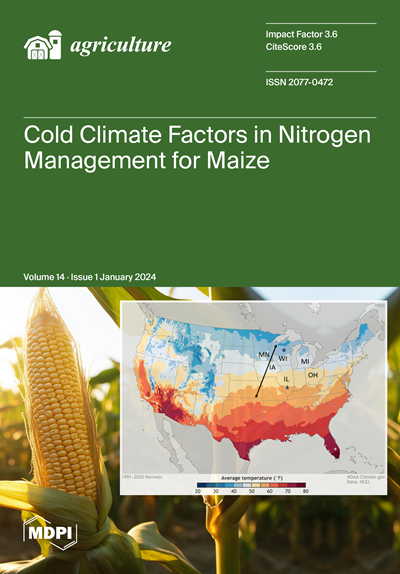不同粒径水稻秸秆培养过程中盐渍土壤酶活性的变化
IF 3.6
2区 农林科学
Q1 AGRONOMY
引用次数: 1
摘要
土壤酶与土壤系统的植物-土壤-酶-土壤养分有关,在土壤碳循环和磷矿化中起着重要作用。在接受有机改良后监测土壤生物质量,特别是酶活性,是土壤可持续管理的先决条件。通过培养试验,研究了不同粒径的米渣(对照、粉状、1 cm、2 cm、5 cm和10 cm)对3种土壤(普通土壤、盐碱地和盐碱地)酶活性的影响。试验土壤呈碱性,pH值为7.05 ~ 8.86,电导率梯度为0.41 ~ 2.5 dS m−1。与对照相比,水稻渣对土壤酶活性(脱氢酶、双醋酸荧光素和碱性磷酸酶)有显著影响。酶活性显著增强,在28天的孵育期间,残渣的大小减小。三种土壤的酶活性最大值均为正常的>盐碱地>盐碱地。这些结果表明,水稻残渣粒度和含盐量是影响土壤残渣分解的重要因素,因为它们直接影响土壤酶的活性,从而对土壤生物库的整体改善产生影响。本文章由计算机程序翻译,如有差异,请以英文原文为准。
Changes in Enzyme Activities in Salt-Affected Soils during Incubation Study of Diverse Particle Sizes of Rice Straw
Soil enzymes are linked to the plant–soil–enzyme–soil nutrients of the soil system, which play an important role in carbon cycling and phosphorus mineralization in soil. Monitoring soil biological quality, particularly enzyme activities, after receiving organic amendments is a prerequisite for the sustainable management of soils. An incubation study was conducted to evaluate the effect of different particle sizes of rice residue (control, powdered, 1 cm, 2 cm, 5 cm, and 10 cm) on the enzymatic activities in three soils (normal, saline, and sodic). The soils used in the study were alkaline in reaction with a pH range of 7.05–8.86 and an electrical conductivity (EC) gradient from 0.41 to 2.5 dS m−1. Significant changes in the soil enzyme activity (dehydrogenase, fluorescein diacetate, and alkaline phosphatase) were observed with the incorporation of rice residue as compared to control. The enzymatic activities were substantially enhanced with a decrease in the size of the residue up to 28 days during the incubation period. The maximum enzymatic activity in the three soils was found to be in the order of normal > sodic > saline soils. These results suggest that the particle size of rice residues and salt levels should be considered important factors in residue decomposition in soils, as they directly influence the activity of soil enzymes for the overall improvement of the biological pools in soils.
求助全文
通过发布文献求助,成功后即可免费获取论文全文。
去求助
来源期刊

Agriculture-Basel
Agricultural and Biological Sciences-Food Science
CiteScore
4.90
自引率
13.90%
发文量
1793
审稿时长
11 weeks
期刊介绍:
Agriculture (ISSN 2077-0472) is an international and cross-disciplinary scholarly and scientific open access journal on the science of cultivating the soil, growing, harvesting crops, and raising livestock. We will aim to look at production, processing, marketing and use of foods, fibers, plants and animals. The journal Agriculturewill publish reviews, regular research papers, communications and short notes, and there is no restriction on the length of the papers. Our aim is to encourage scientists to publish their experimental and theoretical research in as much detail as possible. Full experimental and/or methodical details must be provided for research articles.
 求助内容:
求助内容: 应助结果提醒方式:
应助结果提醒方式:


